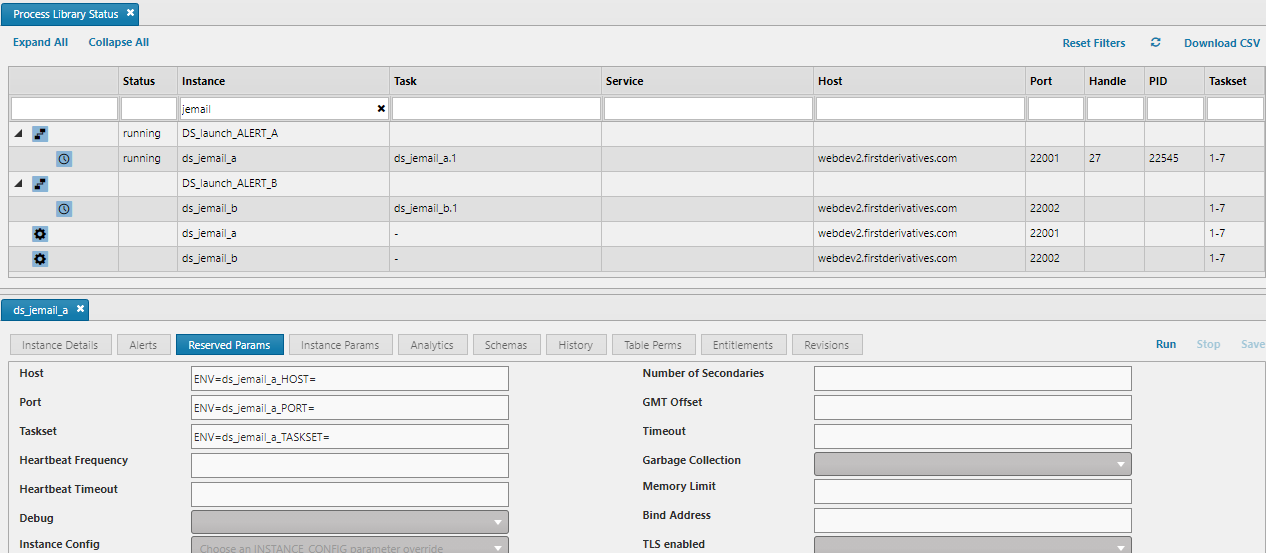Email engine
KX Control supports email notifications for a variety of alerts and actions. These are powered by the Java Email Engine.
KX Stream ships with two instances of the Java Email Engine; an a and a b instance; depending on whether high availability is enabled. Like any instance, it can be run from the Control UI once configured, and will listen for incoming connections on the host and port defined within the instance configuration.

To configure the email engine, set up some configuration parameters.
Configuration
The email engine can be configured to connect to a number of SMTP servers depending on the configuration. The DS_LAUNCH_COMMANDLINE_PARAMS:ds_jemail parameter defines the specific configuration in use by the KX Stream instances.

DS_LAUNCH_COMMANDLINE_PARAMS
Any override of this parameter must define the four variables above, even if you are not using snmp notifications. For example, if you have a custom package which overwrites the default in Control, all four values must be included.
By default this points to the DS_JEMAIL_SERVER:exchangeAnonymous parameter. This can be updated as necessary to another KX Control configuration for common providers as detailed below, or replaced entirely with a new configuration parameter for a unique SMTP server.
| override | details |
|---|---|
| exchangeAnonymous | Allows connection to MS Exchange SMTP servers which allow anonymous logins; or sendmail servers. Their ability to send mail will depend on domain policies |
| exchangeAuthenticated | Allows connection to MS exchange SMTP servers as an authenticated user. Requires authentication details |
| gmail | Configuration aimed at using gmail as SMTP server. Requires external internal access |
DS_JEMAIL_SERVER configuration
The email engine is written in Java and uses the JavaMail API to send messages.
It reads the DS_JEMAIL_SERVER parameter configuration and sets up the email engine system properties.
The necessary properties required depends on the SMTP server.
JavaMail documentation for the necessary system properties per SMTP server.
All properties within the DS_JEMAIL_SERVER override fully support the use of KX Delta Platform ENV notation ENV=##ENV_KEY##= pointing to an environmental variable defined within the deployment.
A subset of properties for the common configurations is shown below; further information available from the JavaMail API documentation
| propertyKey | propertyValue |
|---|---|
| fromAddress | Default originating address for messages; can be overridden by the incoming API call |
| mail.smtp.host | SMTP server hostname |
| mail.smtp.port | SMTP server port |
| mail.stmp.ssl.trust | SMTP trust server, usually same as host |
| mail.smtp.ssl.protocols | Specifies the SSL protocols that will be enabled for SSL connection, example values TLSv1.2 TLSv1.3 |
| mail.smtp.starttls.enable | TLS enabled/disabled; dependant on support |
| mail.smtp.connectiontimeout | Connection timeout |
| mail.smtp.auth | For authenticated SMTP server; enables authentication in JavaMail |
| username | Username for authenticated SMTP server |
| password | Password for authenticated SMTP server |
Sending a message
KX Delta Platform processes can interface with the Java email engine using the public email APIs.
SNMP notifications
In addition to email messages, the email engine can also send SNMP trap (v2) notifications.
SNMP configuration
The email engine can be configured to connect to a number of SNMP management systems depending on the configuration. The DS_LAUNCH_COMMANDLINE_PARAMS:ds_jemail parameter defines the specific configuration in use by the KX Stream instances.

DS_LAUNCH_COMMANDLINE_PARAMS
Any override of this parameter must define the four variables above, even if you are not using email notifications. For example, if you have a custom package which overwrites the default in Control, all four values must be included.
By default this points to the DS_JEMAIL_SNMP:DEFAULT parameter. This can be updated as necessary to another KX Control configuration or replaced entirely with a new configuration parameter for a particular SNMP management system.
DS_JEMAIL_SNMP configuration
The DS_JEMAIL_SNMP parameter defines the SNMP engine to which SNMP trap notifications will be sent.

There are four required properties as detailed below:
| propertyKey | propertyValue |
|---|---|
| community | The SNMP community string, which must be set to the same value as the target system. |
| oid | The object identifier (OID) which the target system will use to identify this engine. The OID should be defined in the Management Information Base of the target system. |
| ipAddress | IP address of the target system. |
| port | The port on which the target system listens for incoming trap messages. This is usually, but not always, the default port 162. |